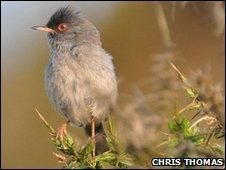Warning for spotters of rare bird near Abergavenny
- Published

The Marmora's Warbler is native to the Mediterranean
Birdwatchers flocking to a Monmouthshire mountain to spot a rare bird are being warned not to disturb other breeding birds in the area.
Hundreds of people have gathered on the Blorenge, near Abergavenny, to see a marmora's warbler, from the Mediterranean islands.
One ornithologist said he believed it had not been seen in Wales before.
Brecon Beacons National Park warden Steve Smith appealed to birdwatchers to stay off moorland in the area.
Posts on Gwent Ornithological Society's website confirmed the marmora's warbler was sighted at the Carn y Gorfydd car park.
Mr Smith appealed to anyone visiting the site to make their observations only from the car park or road.
"There are a number of vulnerable Whinchat and Stonechat nests in the surrounding moorland which should not be disturbed," he said.
Ornithologist and former RSPB site manager Alan Davies saw the warbler after setting off from home in Llandudno, Conwy, at 0430 BST.
"It was absolutely fantastic to see it," he said.
"When we arrived there was thick fog but luckily that lifted and the bird jumped up onto a gorse bush.
"This is extremely rare. It's only the fifth one ever to be seen in the UK since ornithology records began in the 1800s and the first one ever to be seen in Wales, without doubt.
"It is very rare in the world and has a small range, so to wander all the way to Wales is staggering and doubly rare.
"This is great news for Monmouthshire."
It is one of the smallest warblers, with a sooty blue-grey coat, bright red eyes, reddish legs and a long, thin tail.
There are two different forms of the species, one from the Balearics and one from Corsica.
'Biting fingernails'
Mr Davies believes the recent spell of hot weather could be behind its visit.
"Over the weekend there were several hundred people here. On Saturday there were 250 here at dawn alone.
"I'm overjoyed that the little chap stayed around. I was biting my fingernails in case I missed him. He has been singing like mad for a mate.
"He will probably realise he's in the wrong place and hopefully find his way back to his natural habitat."